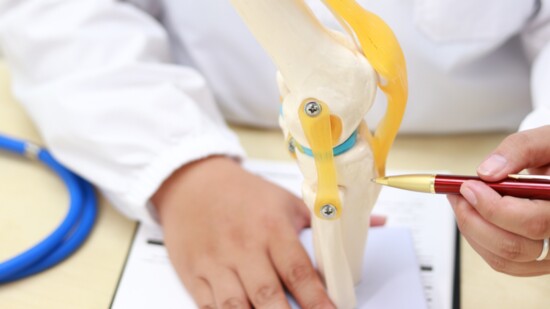Bone health is crucial to overall well-being.
Our bones support our bodies, protect our organs, and store essential minerals like calcium, vitamin D, and phosphorus, which the body releases as needed.
Weak bones can lead to fractures, making bone health especially important, particularly for women.
Patricia Donohue’s Passion
Patricia Donohue, APN, a nurse practitioner from New Jersey, is an expert in bone health. She obtained her nurse practitioner degree from Columbia University School of Nursing. She primarily worked in trauma, surgery and the emergency room, first at Hackensack University Medical Center where she treated patients with traumatic bone injuries.
She later moved to the Hospital for Special Surgery in New York City, where she continued her work in orthopedic trauma while focusing on bone mineralization.
Through this experience, Donohue developed an interest in bone mineralization.
“I was drawn to the subject,” she says.
Her growing interest led her to earn a second master’s degree in public health.
“Bone Mineralization can affect whether or not a patient sustains a fracture,” Donohue explains. “This is especially important in the premenopausal perimenopausal, and postmenopausal, women due to estrogen loss.”
Donohue became passionate about metabolic bone health and bone metabolism. With decades of hands-on experience, she has lectured on the subject at both academic and community levels.
The Importance of Post-Op Care
While at the Hospital for Special Surgery, Donohue helped develop the Fracture Liaison Service, a program developed and supported by the American Academy of Orthopaedic Surgeons and the National Osteoporosis Foundation, which is now the Bone Health Osteoporosis Fountation.
“The program helps identify patients in the hospital after they've sustained fractures that may be due to bone fragility or low-energy fractures,” she says. “These are fractures that happen from everyday activities like walking or falling—not from high-speed accidents.”
This is critical because patients with fragility fractures are five times more likely to experience another fracture, leading to disability, higher healthcare costs, and even death, especially among older patients.
“We’ve seen fractures in younger patients due to poor mineralization as well,” Donohue says. “Bone growth during childhood and adolescence is a key indicator of who will develop osteoporosis later in life. Osteoporosis affects more people than heart attacks, strokes, and breast cancer combined, yet it remains underdiagnosed and undertreated.”
One in two women will sustain a fragility or low-energy fracture in their lifetime, underscoring the importance of addressing bone health early.
Advice for Parents
Donohue advises parents to ensure their children get enough calcium, vitamin D, and exercise—especially during puberty when bones grow most rapidly.
“During adolescence, your body deposits minerals into bones, making them stronger,” she says. “Bones that aren’t loaded properly with exercises lose mineralization. The best example is astronauts in space, who lose bone mass because of the lack of gravity.”
By age 18 to 20, our bones are finished growing.
“What we have at that age is what we have to draw on for the rest of our life,” Donohue says. “That’s why it’s especially important for parents to ensure children get enough calcium and vitamin D.”
It’s also important for children to stay active.
Women and Bone Health
Bone health is especially crucial for women in their 40s and 50s.
“Women can lose up to 20% of their bone mass during menopause,” Donohue says. “The women most at risk for bone fractures are those with a family history of fractures, a low body mass index (less than 18.5), or habits like smoking, excessive drinking, poor nutrition, or a sedentary lifestyle. Certain medications and conditions can also accelerate bone loss.”
Women who are at high risk or undergoing early menopause should get a baseline bone density test.
“Identifying bone loss early allows us to take action—through hormone replacement, calcium, vitamin D, exercise, and nutrition—to prevent osteoporosis,” Donohue says.
Women at high risk should follow up with another test in a year or two to monitor bone density.
Some Bone Health Advice
Donohue recommends that women ask their doctor or gynecologist for a bone density test—especially women who are postmenopausal (T-score) or premenopausal (Z-score).
“Women need to be proactive,” she says. “There has to be greater awareness about the importance of bone health.”
While guidelines suggest women focus on bone health around age 60 to 65, studies by the North American Menopause Society suggest that younger women should start taking proactive steps earlier.
“Gynecologists and primary care doctors need to recognize there are lower dose estrogen alternatives, like patches and bioidenticals, that can help slow bone loss in younger women before they develop osteoporosis,” Donohue says.
For Donohue, It’s All About Her Patients
Now a board-certified acute care nurse practitioner at the Dr. Kayal Orthopedic Center in New Jersey, Donohue brings her passion for bone health to her patients.
“I’m from New Jersey, and this practice is unique because it offers a multidisciplinary approach, with orthopedic surgeons, chiropractors, and physical therapists all working together,” she says. “Dr. Kayal truly values bone mineralization.”
For Donohue, it’s all about helping her patients.
“I’m fortunate to be able to treat these patients in New Jersey just like I did in New York,” she says. “It’s rewarding to bring my passion and expertise to the center and to help the people of New Jersey.”
For more info visit kayalortho.com.
“Bone growth during childhood and adolescence is a key indicator of who will develop osteoporosis later in life. Osteoporosis affects more people than heart attacks, strokes, and breast cancer combined, yet it remains under-diagnosed and under-treated.” - Patricia Donohue, APN
